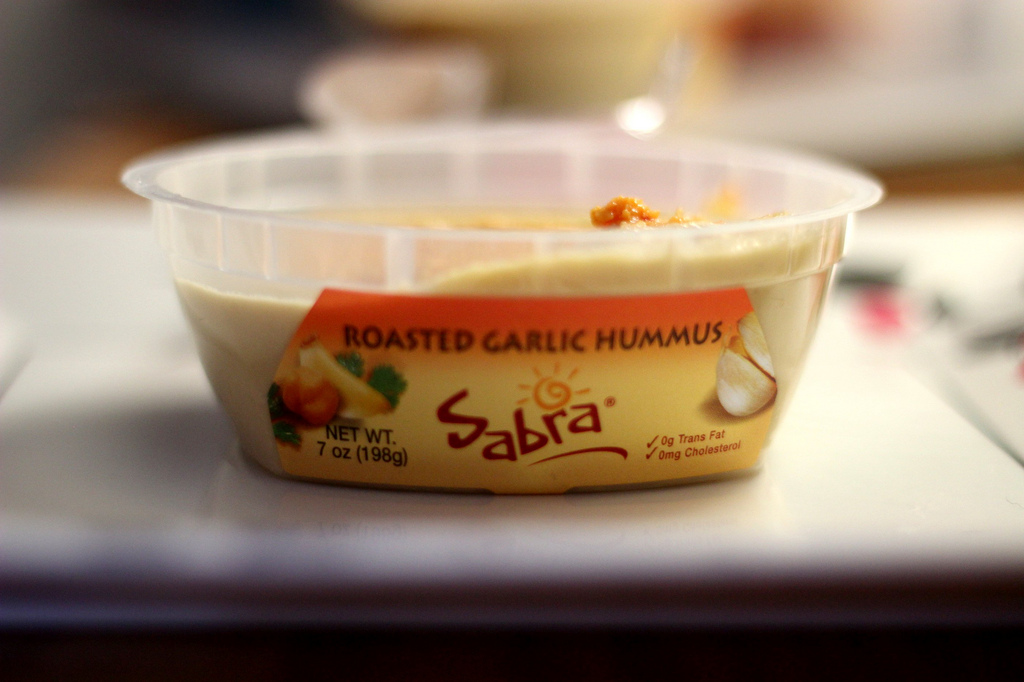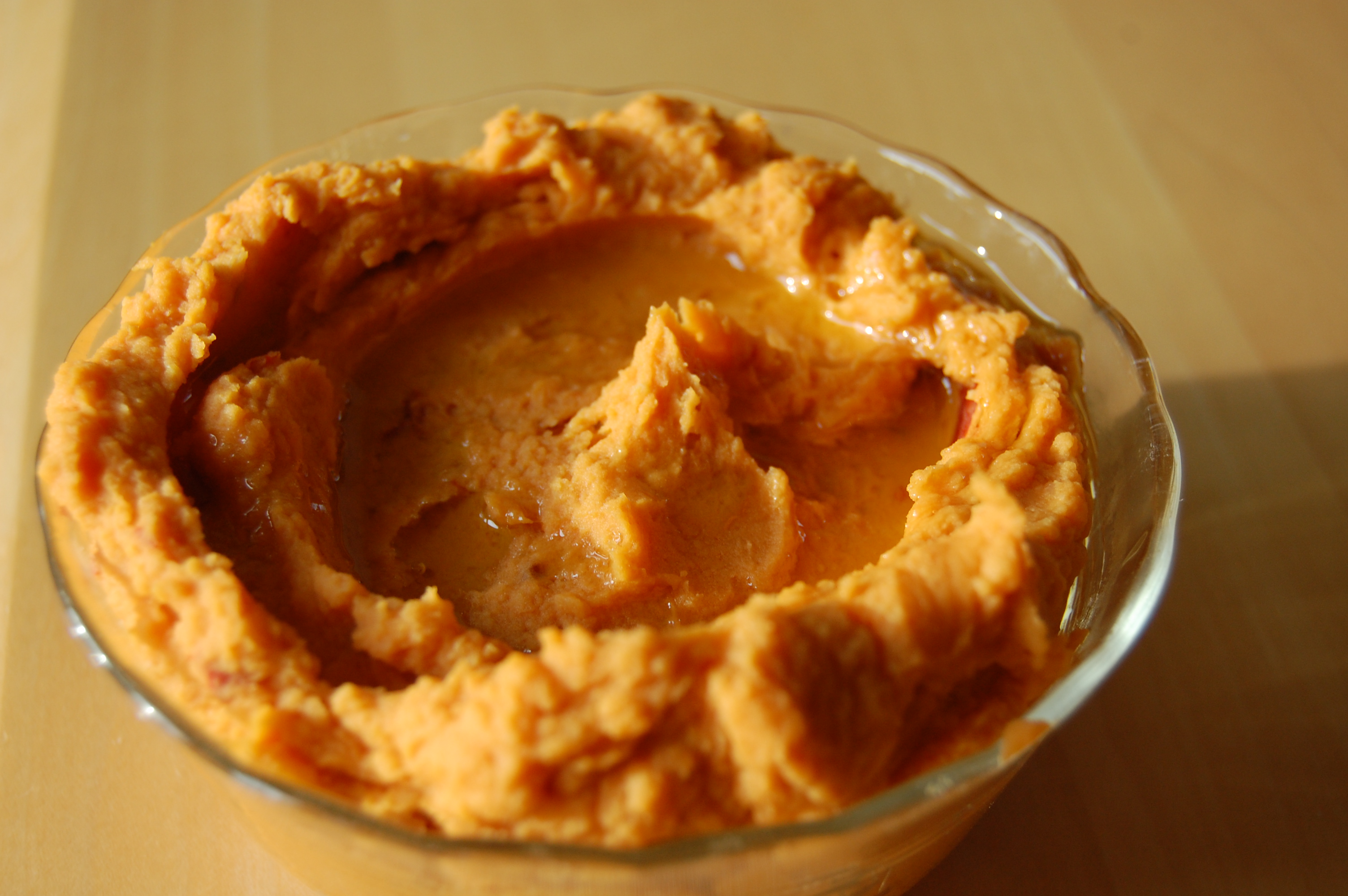- Photo by Kim Buesser
Hummus also serves as a great sandwich spread, as opposed to mayonnaise which has more than twice the amount of fat per serving. More flavor, less fat, I’m starting to wonder why I don’t have my own stockpile in my fridge.
Now here’s where my enthusiasm for neuroscience comes in. Wait wait! Trust me, it’s cool! (With no iClickers involved)
A study done by Marije aan het Rot, Debbie S. Moskowitz, Gilbert Pinard and Simon N. Young, published in the Journal of Psychiatry and Neuroscience, evaluated the effects of tryptophan on human behavior. Tryptophan is an amino acid notably known for it’s aid in the production of serotonin, which is an important neurotransmitter affecting our mood. The lack of serotonin is strongly correlated to mood disorders such as anxiety and depression.
The results of the experiment showed that an increase in serotonin, through intake of tryptophan, lead to a decrease in confrontational, aggressive behavior, as well an increase in agreeable behavior.
So what?
Hummus is loaded with tryptophan! It is a healthy and happy-inducing food, both physically and mentally.
More good stuff here:
- Peanut Butter Hummus
- DIY Salad Dressings: Your Vinagrette Toolbox
- PB & J Alternatives
- Give Your Mornings a Break with “Overnight Oats”
- Anatomy of a Smoothie
Hummus? The first time I heard about it, it sounded like a whole new language to me; I mean, it technically is. “Hummus” is the Arabic word for “chickpea”, also known as garbanzo bean (which ALSO happens to be featured in one of my favorite TV shows as a kid. Zoboomafoo anyone?).
I’ll admit, I was skeptical at first of how a pale, gloppy substance could exceed any basic level of yumminess. But after taking my first scoop, crunched off with a pretzel? Boy was I wrong. I then understood why Zaboo the lemur would always go crazy before getting his fill of garbanzo beans. Now combined into a paste with tahini (sesame seed butter) along with pita bread, pretzels, crackers, or veggie sticks for dipping? Absolutely delicious.
Are you ready for the breakdown that will blow your mind?
The main ingredient in hummus is chickpeas (of course), which is LOADED with nutrients and minerals. It is a great source of folic acid, potassium, magnesium, phosphorus, iron, and zinc; minus the rest of the periodic table. The most important nutritional aspects of chickpeas are their fiber and protein content, which besides being two healthy-terms-we-all-kinda-know-ish, means that it’ll suppress that growling stomach for a longer duration. Hello happy tummy!
Hummus is widely used in vegetarian diets, serving as a healthy alternative to meat since its protein will supply you with that much needed energy. Its low glycemic index (how quickly blood levels rise) keeps your blood sugar level balanced, also contributing to that satisfied-fullness. Hummus is naturally gluten-free, and most companies supplying packaged hummus stick to this, as well as providing a variety of different flavors.

Photo by Annie Eng
But freshly made is always healthier than factory made, so if you want to try your hand at making your own hummus, check out this simple recipe by Parisa Soraya. If you’re looking to spice things up (or sweeten), there are endless possibilities of personalizing your hummus. Try this Sweet Potato Chipotle Hummus!
- Photo by Kim Buesser
Hummus also serves as a great sandwich spread, as opposed to mayonnaise which has more than twice the amount of fat per serving. More flavor, less fat, I’m starting to wonder why I don’t have my own stockpile in my fridge.
Now here’s where my enthusiasm for neuroscience comes in. Wait wait! Trust me, it’s cool! (With no iClickers involved)
A study done by Marije aan het Rot, Debbie S. Moskowitz, Gilbert Pinard and Simon N. Young, published in the Journal of Psychiatry and Neuroscience, evaluated the effects of tryptophan on human behavior. Tryptophan is an amino acid notably known for it’s aid in the production of serotonin, which is an important neurotransmitter affecting our mood. The lack of serotonin is strongly correlated to mood disorders such as anxiety and depression.
The results of the experiment showed that an increase in serotonin, through intake of tryptophan, lead to a decrease in confrontational, aggressive behavior, as well an increase in agreeable behavior.
So what?
Hummus is loaded with tryptophan! It is a healthy and happy-inducing food, both physically and mentally.
More good stuff here:


